May 18, 2025 | 12:47 GMT +7
May 18, 2025 | 12:47 GMT +7
Hotline: 0913.378.918
May 18, 2025 | 12:47 GMT +7
Hotline: 0913.378.918
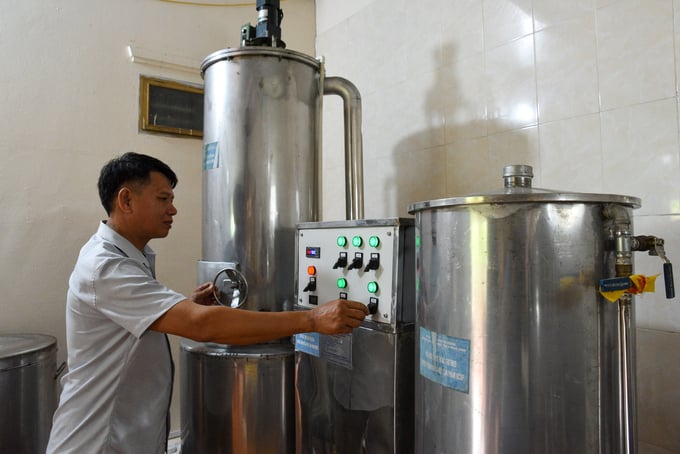
Mr. Dang Thanh Tung next to the hydraulic lowering system. Photo: Duong Dinh Tuong.
In 2012, a United Nations delegation visited the beekeeping facility of Mr. Dang Thanh Tung (Dai Hop Commune, Kien Thuy District, Hai Phong City).
A Japanese expert in the delegation advised him: “Try to separate the water and lower the honey moisture content to improve quality and ensure longer preservation”. Mr. Tung asked for clarification, but due to language barriers and the translator's lack of expertise, he just noted it down without much follow-up.
In 2017, Mr. Tung attended a training course on agricultural product branding organized by the Department of Agriculture and Rural Development of Hai Phong. He was advised by Professor Nguyen Lan Dung that to produce honey, it is necessary to lower the moisture content and this technology is now available in Vietnam.
However, for the next two years, Mr. Tung continued his search without any leads. By chance, while visiting Hai Duong to learn about beekeeping, he heard that a moisture-reducing machine was available in Bac Giang. He was eager to go, but before he could, the Covid-19 pandemic hit, leading to social isolation. It wasn't until 2020 that he managed to purchase a honey moisture-reducing machine from a domestic company, based on Japanese principles but with a smaller capacity. Instead of costing several hundred thousand dollars for a batch of thousands of liters, this machine was priced at around 15.000 USD for a batch of 300 liters, reducing moisture from 27-28% to 21%, in line with international standards.
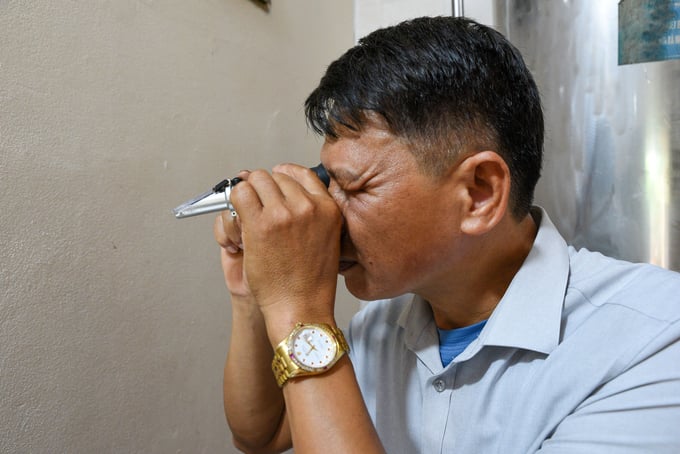
Mr. Dang Thanh Tung is checking the moisture content of the honey. Photo: Duong Dinh Tuong.
In his first experiment with 100 liters of honey, he managed to reduce the moisture content to 23%, but after two months, it darkened and developed a sour taste, with an unsightly ring of bubbles still visible around the neck of the bottle. Although customers praised it, he was not satisfied and continued to experiment. After two years and around 40 test batches of honey, he finally perfected the standard process.
First, to ensure high quality, the honey must have its moisture content reduced within six hours after harvesting, as the environment inside the honeycomb prevents fermentation, but exposure to air initiates fermentation. Second, after separating the moisture, it is essential to store it in a high tank, about 2 meters tall, to create pressure that allows the honey to settle while the bubbles rise and gradually dissipate.

Beehives are covered with foam to protect against heat. Photo: Duong Dinh Tuong.
Mr. Tung was the head of the inspection committee for the Dai Hop Agricultural Cooperative for five years, but he resigned due to disagreements with the leadership's production and business plans. When the new Cooperative Law was introduced, the commune called on him to return and help the cooperative, but he declined. It wasn't until 2020, after thoroughly studying the new Cooperative Law, that he decided to establish Tung Hang Honey Production Cooperative to enhance the economy for himself and the local community, as he believed he couldn't go far on his own.
Secondly, having legal status allows for signing contracts with supermarkets and stores. Thirdly, there are government support resources. When he shared his intention, some sincerely advised against it, saying many cooperatives were dissolving. They questioned why he would establish a new cooperative after previously leaving one.
He explained that he left the previous cooperative because he disagreed with the old Cooperative Law, which operated under a "shared management" model where no one took full responsibility. However, with the new Cooperative Law, he fully supported it because it would enhance the rights of members and the initiative of cooperative leadership.
The Tung Hang Honey Production Cooperative was established with 7 members, producing a modest 1.000 liters in 2020. In 2021, production increased to 2.800 liters. By 2022, output rose to over 6.000 liters, with an additional 2.000 liters sourced from external households. In 2023, production reached 10.000 liters. The wholesale price remained stable at 10.50 USD/liter.
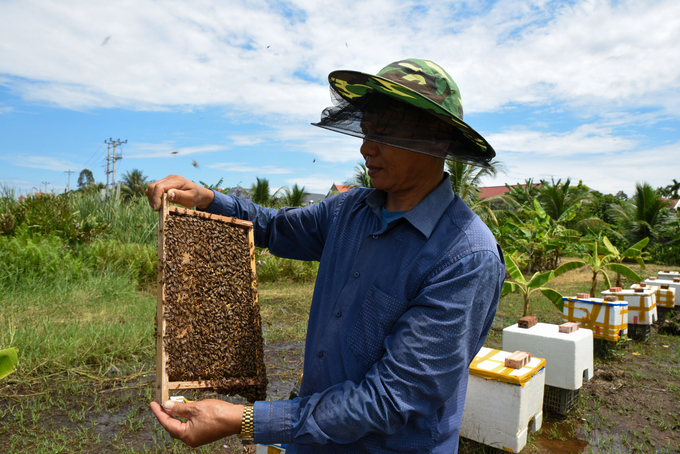
Mr. Dang Thanh Tung is checking the bee colonies. Photo: Duong Dinh Tuong.
During the beekeeping process, there are two months in winter and one month in summer when the forest lacks flowers, making it necessary to feed the bees sugar, or they will starve and die. At that time, the honey may contain sugar, resulting in a less fragrant product that still looks golden and beautiful. The cooperative only sells this honey to local businesses that raise fighting buffaloes in Do Son or to traditional medicine shops for medicinal use, rather than to consumers, in order to protect its brand. To maintain brand integrity, the cooperative requires members to refrain from extracting honey independently; instead, it must be done by a harvest team of three people to prevent any mixing of products.
The "three-three team" determines when to extract honey based on the flower source, the bee population (large numbers and fitness level). On average, it takes 15-20 days for honey from the mangrove forest to be ready for extraction, while honey from the Bang La apple blossom has a shorter timeframe. Recently, one member of the cooperative received a warning for not adhering to this regulation.
"In nature, there are two types of honey: flower honey and leaf honey (produced from the young shoots of trees like acacia and rubber). Native bee species will not consume leaf honey, even if they are starving; they will still feed the larvae. In contrast, foreign bee species will eat anything sweet and if they feel a bit hungry, they may even eat the larvae or discard them.
Exploiting the foreign bees' voracious appetite, some people, even when there are plenty of flowers during the season, continue to mix sugar into the feeding trays at night after the bees have fed during the day, aiming for higher yields, which results in less fragrant honey. In Bang La Ward, there is a foreign bee farm with about 500 colonies.
To protect the brand and safeguard native bees from foreign species that can overpower and kill the queen, destroy hives, and steal honey, I have repeatedly recommended that foreign bees be prohibited from entering the mangrove forest in Dai Hop Commune. The Livestock Law stipulates that foreign bee farms must be at least 2 kilometers away from native bee farms, but in practice, it's difficult for authorities to intervene when issues arise", Mr. Tung lamented.
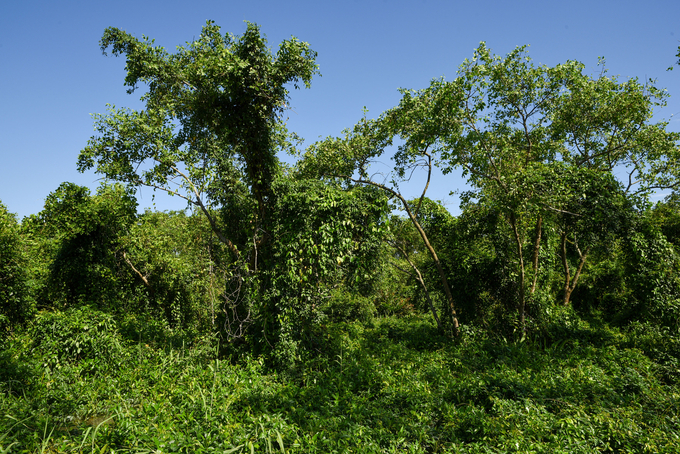
A corner of the Dai Hop mangrove forest. Photo: Duong Dinh Tuong.
Currently, there are about 100 households engaged in beekeeping in Dai Hop Commune and Bang La Ward. The Tung Hang Honey Production Cooperative alone has approximately 1.000 colonies, with Mr. Tung personally managing 300, while other households have anywhere from a few dozen to several hundred colonies, including Mr. Hoang Van Sy, Nguyen Minh Tra, Nguyen Van Hien and Nguyen Van Khanh.
According to Mr. Tung, to develop a honey production business, a minimum of 20 colonies is required, as each well-managed colony can produce about 15 liters of honey per year, averaging 7-8 liters annually, yielding around 1.260 USD, enough to support a person beyond working age. With his family's 300 colonies, they earn about 42.500 USD annually, with a profit of 25.500 USD.
In 2020, the honey products of the cooperative were recognized as OCOP3-star. By 2023, they were upgraded to OCOP 4-star. Achieving this required Mr. Tung to tirelessly run back and forth to the district and city to handle procedures and quality testing for the honey, causing him to lose 5-6 kg. His wife, worried about his health, told him: “My honey isn’t spoiled or unsold, and if you’re working this hard, it won’t achieve OCOP status anyway. I can’t take care of you if you keep losing weight”. He had to sweet-talk her, saying “If we want the cooperative’s products to reach further, we have to do this”.
Mr. Dang Van Thuy, Secretary of Dong Tac Village (Dai Hop Commune), stated that since the mangrove forest has been protecting against waves, the commune has not experienced dike breaches or floods like before. Additionally, there is now an endless supply of seafood for thousands of locals who go into the forest to fish, earning several dollars to even up to 42 USD each day. The forest also provides flowers for the bee colonies, creating livelihoods for hundreds of beekeeping households.
Previously, Dai Hop was impoverished, but now the economy is thriving, with only one poor household remaining in the village. It is expected that by 2025, this will be completely eliminated.
Translated by Phuong Linh

(VAN) Deputy Minister Nguyen Quoc Tri also expressed his hope that Cuba will soon overcome its current challenges, attain food security, and further expand cooperation with Vietnam.

(VAN) The project contributes to enhancing the resilience of communities vulnerable to the impacts of climate change, with a primary focus on local women.
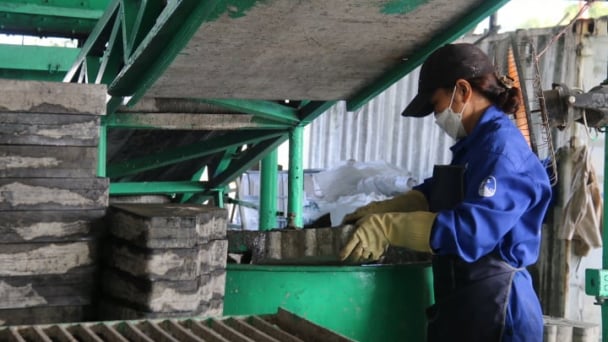
(VAN) Green materials help save energy and resources. However, after more than 10 years, Vietnam has only developed over 200 green buildings with more than 6 million square meters of floor space.

(VAN) Vietnam - Thailand Business Forum 2025: One plus one on three connects, marking a milestone in the comprehensive strategic partnership between the two nations.
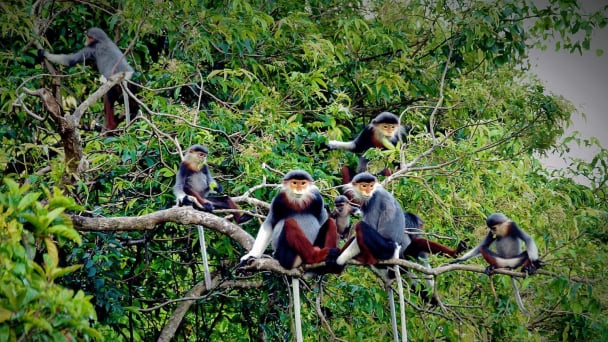
(VAN) The United Nations designated 22 May as the International Day for Biodiversity 2025 with the theme 'Harmony with nature and sustainable development.'
![Multi-channel, multi-directional Vietnamese agricultural markets: [8] A national strategy is needed](https://t.ex-cdn.com/nongnghiepmoitruong.vn/608w/files/phucpm/2025/05/15/1435-thi-truong-nong-san-viet-da-kenh-da-huongbai-8-can-mot-chien-luoc-quoc-gia-084750_728.jpg)
(VAN) The Chairman of Hung Nhon Group shared: ‘Opening up and tapping into new markets is the right and strategic direction for Vietnam's agricultural sector.’
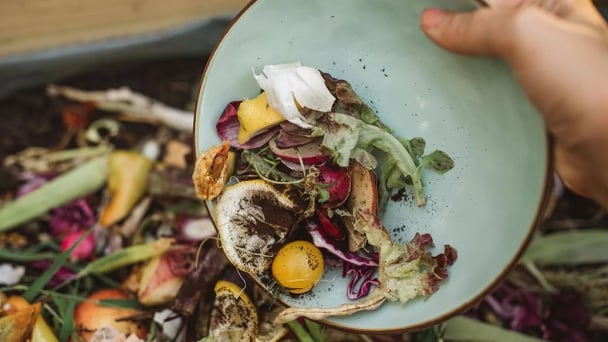
(VAN) Food waste has become a serious issue in modern society, especially in rapidly urbanizing and developing cities like Hanoi.